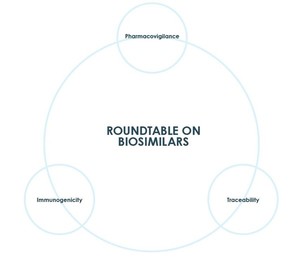The American Society of Clinical Oncology (ASCO) has released a new policy statement on the use of biosimilar and interchangeable products in oncology.
The statement proposes guidance and recommendations for stakeholders, including manufacturers, payers, regulatory agencies, clinicians, and patients, to ensure equitable access to high-quality care and to address challenges to biosimilar uptake [1].
In 2018, ASCO released a position statement on biosimilars in oncology, providing education and guidance to the oncology community regarding the assessment of the safety and efficacy of biosimilars in the cancer setting [2].
To date, FDA has approved 42 biosimilars within the product classes of insulin, granulocyte colony-stimulating factor, monoclonal antibodies, and tumour necrosis factor-alpha (TNF-α) [3].
The first oncology biosimilar was approved by the FDA in 2015. Since then, the FDA has approved a total of 22 cancer or cancer-related biosimilar products. This includes 12 agents currently approved for use in the treatment of cancer and 10 for use as supportive care agents. ASCO proposes several policy recommendations across the scope of value, interchangeability, clinician barriers, and patient education and access to guide the use of these products in cancer care.
Interchangeability
As of now, there are no FDA-approved interchangeable products in oncology. Up to this point, only four interchangeable biosimilar products have received approval, and these are used to treat diabetes, specific inflammatory conditions, and certain eye diseases.
FDA defines an interchangeable product as a ‘biosimilar that meets additional requirements outlined by the law that allows for the FDA to approve biosimilar and interchangeable medications’. An interchangeable biosimilar can be substituted at the pharmacy level, without the approval of the prescriber (similar to generics) [4, 5].
According to ASCO, interchangeability is simply a regulatory term that has created confusion about the inherit lack of clinically meaningful difference of a biosimilar. A recent ASCO expert panel report, biosimilars and their reference products are viewed as equally efficacious for the purpose of inclusion in ASCO clinical practice guidelines.
ASCO 2023 policy recommendations
The several recommendations proposed by ASCO on biosimilar and interchangeable products in oncology include [1]:
1. Patients and clinicians
– Stakeholders should ensure equitable access to high-quality care, including financial counselling to access patient assistance programs that provide financial assistance to low-income individuals for biosimilars.
– In its commitment to expand education on biosimilar products, ASCO and other organizations should develop and maintain up-to-date, audience-appropriate educational materials that are readily available for patients to ensure confidence in the safety and efficacy of biosimilar products.
– Physicians should discuss with their patients any proposed switching and whether this is the best treatment option according to evidence. The final therapeutic decision should be clearly stated in the treatment plan.
2. Payers
– Payers should ensure that changes to prescribed therapies for patients are made only in the context of prior consultation between the patient and physician. At a minimum, payers should continually update and ensure transparency by clearly describing their formulary design and preferred choice of biologic products.
– Individual payers should develop plans to help clinicians mitigate or avoid complications with stocking and maintaining multiple biosimilars of the same class.
3. Pharmacy
– Both federal and state entities should ensure that pharmacists are educated and aware of allowable biosimilar substitutions to their reference product.
– If a patient is already on an established therapy, the final decision to switch to a biosimilar product should be made by the patient and physician. In all cases of substitution, patients and physicians should be notified immediately.
4. Government
– The Biologics Price Competition and Innovation Act (BPCIA) distinction between interchangeability designation and biosimilars is unnecessary, burdensome, and creates barriers to high value care. Therefore, the US Congress should enact legislation amending the BPCIA to remove the term, designation, and additional requirements for interchangeability.
– To protect patients, federal and state governments should ensure the appropriate regulation of biosimilars in accordance with its Food and Drug Administration (FDA) designation.
– The federal government should enact legislation limiting the ability of biologic and biosimilar manufacturers to delay market entry of biosimilars.
-The federal government should enact legislation to reduce data exclusivity on biologic products.
– The federal government should enact legislation that authorizes the Federal Trade Commission to initiate enforcement proceedings against manufacturers on any patent infringement claim in connection with the sale of biologic products.
5. Research
– Robust clinical data are necessary to ensure continued safety and efficacy of biosimilars. FDA and industry should continue to ensure rigorous pharmacovigilance monitoring, including evaluating any product quality concerns. Such data should provide the necessary level of confidence for their use by patients and clinicians.
– ASCO and the stakeholder community should encourage research on cost-effectiveness of biosimilars, including adequate inclusion of indirect costs of cancer, particularly between biosimilars and subcutaneous formulations.
Achieving the full benefits and cost reductions of biosimilars requires the active participation of all parties involved. Gathering input from these stakeholders is essential to create a well-planned strategy for overcoming obstacles in the adoption of biosimilars, including issues like excluding them from approved medication lists, practical barriers, and a lack of clear guidelines for their use.
Related articles
GADECCU position statement on biosimilars updated
American College of Rheumatology position statement on biosimilars updated
American Academy of Ophthalmology biosimilars position statement published
|
LATIN AMERICAN FORUM
The new section of the ‘Latin American Forum’ on GaBI has been launched. The objective of this new section is to provide you with all the latest news and updates on developments of generic and biosimilar medicines in Latin America in Spanish. View the latest headline article: Los datos a largo plazo respaldan la comparabilidad clínica de AVT04 con Stelara Browse the news in the Latin American Forum! Register to receive the GaBI Latin American Forum newsletter. Inform colleagues and friends of this new initiative.
FORO LATINOAMERICANO
Se ha lanzado la nueva sección del ‘Foro Latinoamericano’ sobre GaBI. El objetivo de esta nueva sección es brindarle las últimas noticias y actualizaciones sobre desarrollos de medicamentos genéricos y biosimilares en América Latina en español. Ver el último artículo de cabecera: Los datos a largo plazo respaldan la comparabilidad clínica de AVT04 con Stelara !Explore las noticias en el Foro Latinoamericano! Regístrese para recibir el boletín informativo GaBI Foro Latinoamericano. Informe a colegas y amigos sobre esta nueva iniciativa.
|
References
1. Rodriguez G, Mancuso J, Lyman GH, et al. JCO Oncol Pract. ASCO Policy Statement on Biosimilar and Interchangeable Products in Oncology. 2023;19(7):411-9.
2. GaBI Online - Generics and Biosimilars Initiative. ASCO issues position statement on biosimilars in oncology [www.gabionline.net]. Mol, Belgium: Pro Pharma Communications International; [cited 2023 Mar 24]. Available from:
www.gabionline.net/biosimilars/general/ASCO-issues-position-statement-on-biosimilars-in-oncology
3. GaBI Online - Generics and Biosimilars Initiative. Biosimilars approved in the US [www.gabionline.net]. Mol, Belgium: Pro Pharma Communications International; [cited 2023 Oct 24]. Available from: www.gabionline.net/biosimilars/general/biosimilars-approved-in-the-us
4. GaBI Online - Generics and Biosimilars Initiative. US Senate clarifies status of interchangeable biosimilar exclusivity [www.gabionline.net]. Mol, Belgium: Pro Pharma Communications International; [cited 2023 Oct 24]. Available from: www.gabionline.net/policies-legislation/us-senate-clarifies-status-of-interchangeable-biosimilar-exclusivity
5. GaBI Online - Generics and Biosimilars Initiative. FDA releases new information on interchangeable biologicals [www.gabionline.net]. Mol, Belgium: Pro Pharma Communications International; [cited 2023 Oct 24]. Available from: www.gabionline.net/biosimilars/general/FDA-releases-new-information-on-interchangeable-biologicals
Permission granted to reproduce for personal and non-commercial use only. All other reproduction, copy or reprinting of all or part of any ‘Content’ found on this website is strictly prohibited without the prior consent of the publisher. Contact the publisher to obtain permission before redistributing.
Copyright – Unless otherwise stated all contents of this website are © 2023 Pro Pharma Communications International. All Rights Reserved.








 0
0











Post your comment